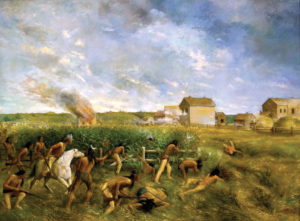INSIDE THE WALLS | Remember the Dakotas
 “Attack on New Ulm” by Anton Gag (1904)
“Attack on New Ulm” by Anton Gag (1904) Despite being a humanist for over fifteen years, my views can be misanthropic from time to time. For example, earlier this year I took part in an organized debate in my prison humanist group, the topic being, “Should prisoners be allowed to vote?” I enthusiastically took the negative position, arguing, “How many of you have ever written to your congressperson, signed a petition, or voted before?” Only one in twelve had voted before incarceration. That kind of inaction is so widespread, I argued, why then should you want these things now?
Rhetoric is one thing. When it comes to human rights, I believe in minimal government interference. In the last couple of days, free-world individuals have asked my views on the George Floyd case. This is a time when First Amendment rights are misinterpreted, exercised, and challenged. I have been asked what I believe can be done in the future to prevent the kind of injustice that was inflicted upon Floyd. The misanthropic, knee-jerk answer is “nothing.” Racism will always exist. Human nature is historically predatory. It literally takes time, evolution, education, and a movement to convince people to cultivate their better natures.
My answer out loud was not so philosophical but very specific. When a citizen takes someone’s life, they’re charged with some combination of first-degree murder, conspiracy to commit murder, willful injury, assault, possession and use of weapons, possible hate crimes, and abuse of power relevant to their position. Why are police officers not charged with all possible violations to the highest degree?
My point, quite simply, is that until officers face a life sentence (not to mention unobtainable bail), the consequences will never scream loud enough to prevent such injustice. Granted, there are those who will offend and break laws no matter what the punishment. There still needs to be some form of equal treatment. I take this view because I look at the options and have no confidence in them. “Better training” is more of a punchline than a solution. How could better training have prevented what happened to Laquan McDonald, Eric Garner, Philando Castile, and Botham Jean to name but a few? If only the world could achieve peace via a conversation. More training equals a bigger budget, more overtime pay, and less liability for police departments.
The other option that automatically comes to mind is that of fang and claw. The type of retaliation that makes the most noise but the smallest progress. I am just a poor prisoner with very little formal education. My analysis is probably worth less than the ink it cost to print it. In looking at options for the future, I tend to look at the past. That is one way of forecasting what will happen and what could happen.
The Dakota Uprising occurred in 1862 in the state of Minnesota. In response to being deprived of food and land, several Dakota men resorted to robbing and killing white settlers. This led to a bounty on Dakota scalps and the largest state-sanctioned execution in US history.
When I learn about Native American resistance, I inwardly cheer as these were my ancestors. I also realize that when we resort to violence, we forfeit the right to civility. Already the dialogue in Minneapolis has been shifted from, “What can we do to stop the killing of African-American men?” to “We must stop these out-of-towners from committing vandalism!”
I applaud those who responsibly exercise their right to assemble and protest. I scowl at any inference that they’re doing so unlawfully. I also believe that until law enforcement is subject to the same brand of justice that we are, the consequences won’t be taken seriously.
Author’s note: this was written before the charges were upgraded and expanded in the Floyd case.
